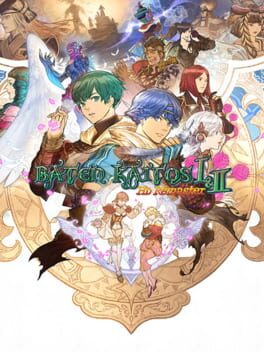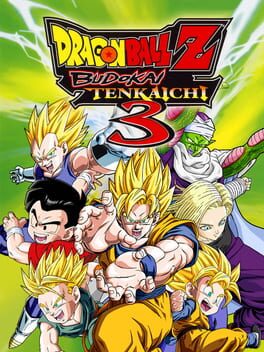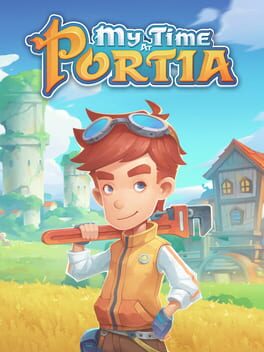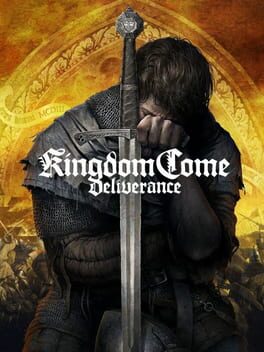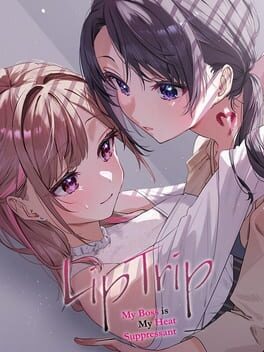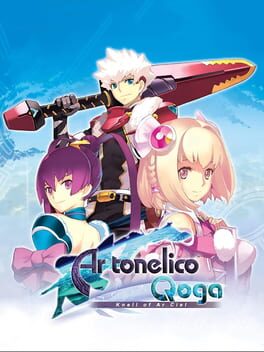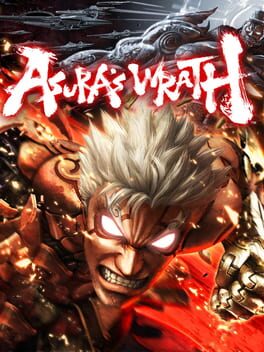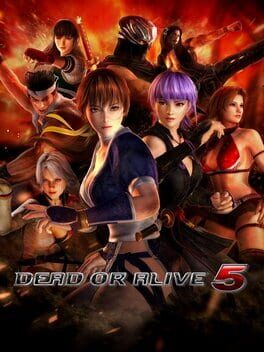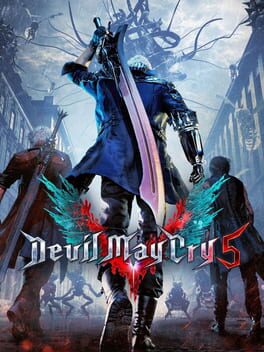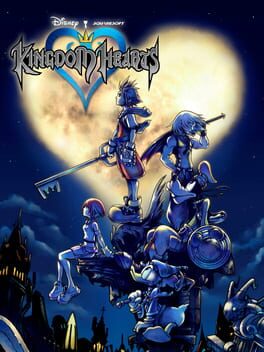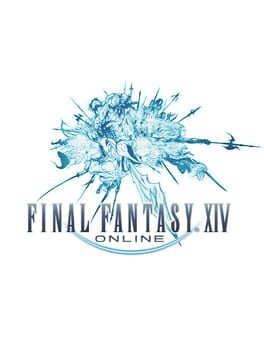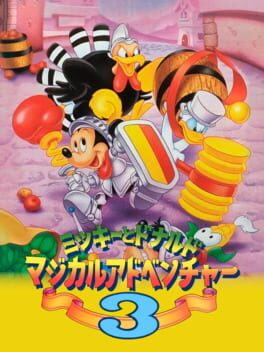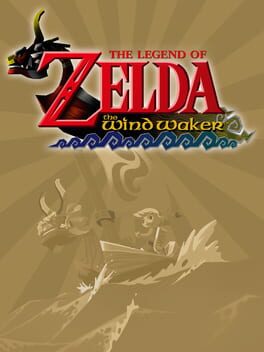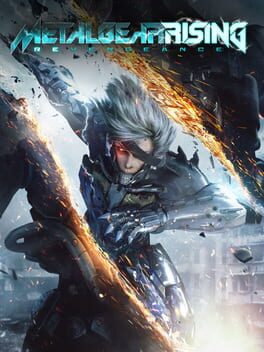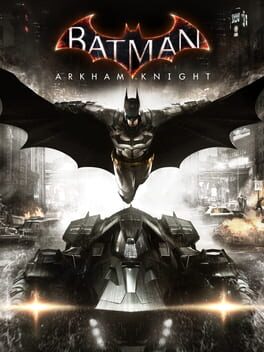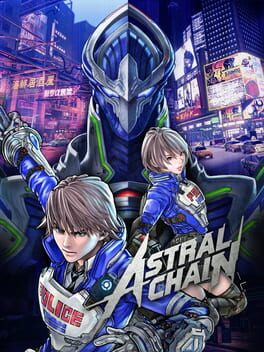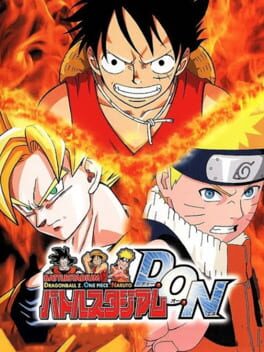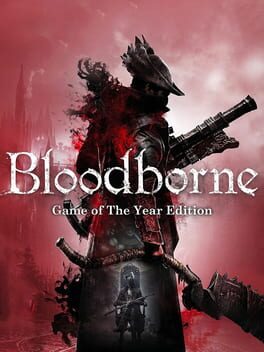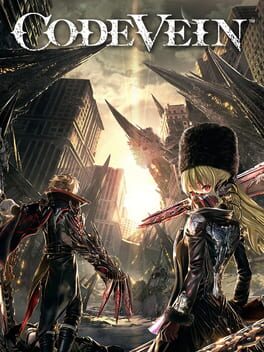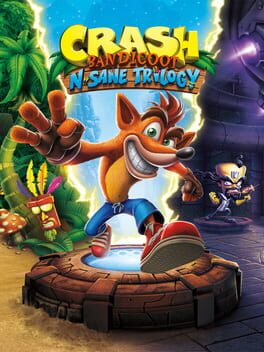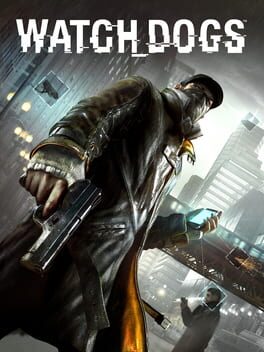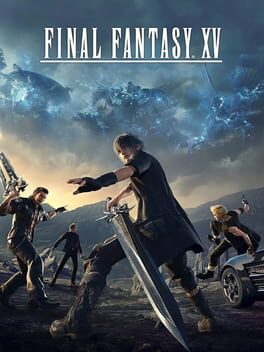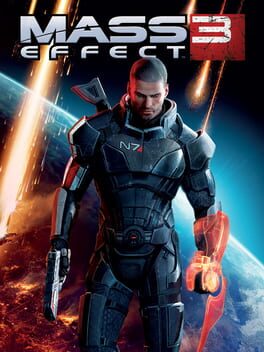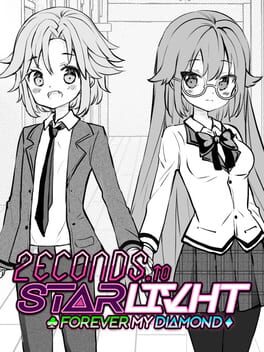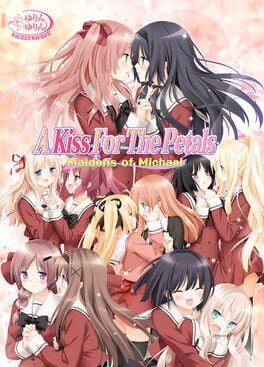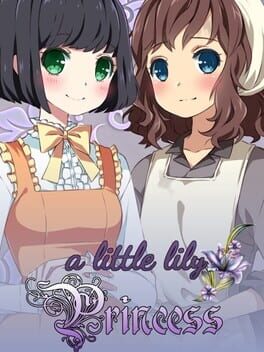LizardGoddess
288 reviews liked by LizardGoddess
The remaster of both Baten Kaitos games is, in most aspects, pretty good and gives you a nice option to play Baten Kaitos I & II. Though it is unfortunate that the English dub isn't included in this remaster, for the first game, this isn't that big of a deal because the English dub wasn't that good, but it's a bit of a shame for Baten Kaitos Origins, which had a pretty good dub. Overall, I don't think it's that big of a problem, but it would've been nice if they included it, or maybe even rerecorded the English dub.
The quality of life features are also a nice addition and can make the experience more pleasant.
In my opinion, both games would've benefited more from a whole remake, as opposed to "just" a remaster. But I'm still glad that we've gotten both games for the Switch in this form. I'd also like to see a third Baten Kaitos game in the future, and hopefully more people will experience these wonderful games through the remaster.
That's pretty much all I have to say about the remaster, so to end this, here are also my reviews for both games:
Baten Kaitos I:
Baten Kaitos is a great game that has beautiful and very creative pre-rendered backgrounds. The card-based battle system is very interesting, and I fairly liked it. Overall, this is a fantastic RPG from Monolithsoft.
The characters were quite nice, I especially loved Xelha and Kalas. Regarding the other party members, I think they were fairly good, but nothing too special. Not bad, but also not outstanding.
The story was also wonderful, I at least had a great time with it. Foreshadowing is definitely a strength of this game.
The pre-rendered backgrounds are totally beautiful, though I think the navigation on these can become a bit confusing. With that, I mean that sometimes it can be quite hard to see where you can walk and where you have to go.
Personally, I prefer whole 3D games because I think the experience isn't that immersive with pre-rendered backgrounds, but I think with the power of a Gamecube it worked pretty well in this game.
I'm glad to have experienced and played this game, and I'm really looking forward to playing Baten Kaitos Origins. As far as I can tell from this game, Baten Kaitos is another great Monolithsoft game series.
Baten Kaitos II:
After finishing this game, I have to say that I really loved it. I probably liked it as much as Baten Kaitos I, and I may even prefer it a little bit over the first game.
Firstly, it improves in some aspects from the original, as an example, the battle system is faster than in the first game, and the wings are now also integrated into the gameplay, which I really liked. But it not only improves in some aspects, I think it's also a bit worse in some areas. The battle system is simpler and more straight-forward than in the first game, and while it makes it faster, you do not have as many options as in the first game. So I don't think it's an overall improvement, but the advantages of it also don't make it worse. Always organizing your deck in Baten Kaitos I was a bit annoying to me, and only having to manage one for the whole party in Baten Kaitos Origins was more convenient to me. So I can see how someone can prefer the battle system from Baten Kaitos Origins over the one from the first game, and inversely, how someone can prefer the one from Baten Kaitos I over the battle system from Origins.
Next, the characters were great. I really liked Sagi, Milly and Guillo. The dynamic between these characters is fantastic, and the smaller cast size compared to the first game was, in my opinion, a good decision for this game. Though I really liked Kalas and Xelha in Baten Kaitos I, I don't think the other characters were that memorable, not bad, but also not outstanding either.
Regarding the story, I think it was really gripping and good, and so overall, it was a bit better than the one from the first game.
Lastly, not to forget, the soundtrack is absolutely fantastic, just like the first Baten Kaitos game. I especially love the battle theme, it's great.
So after all, I can totally recommend this game, especially if you played and liked the first Baten Kaitos game. It's a wonderful prequel and definitely deserves to be talked about more.
The quality of life features are also a nice addition and can make the experience more pleasant.
In my opinion, both games would've benefited more from a whole remake, as opposed to "just" a remaster. But I'm still glad that we've gotten both games for the Switch in this form. I'd also like to see a third Baten Kaitos game in the future, and hopefully more people will experience these wonderful games through the remaster.
That's pretty much all I have to say about the remaster, so to end this, here are also my reviews for both games:
Baten Kaitos I:
Baten Kaitos is a great game that has beautiful and very creative pre-rendered backgrounds. The card-based battle system is very interesting, and I fairly liked it. Overall, this is a fantastic RPG from Monolithsoft.
The characters were quite nice, I especially loved Xelha and Kalas. Regarding the other party members, I think they were fairly good, but nothing too special. Not bad, but also not outstanding.
The story was also wonderful, I at least had a great time with it. Foreshadowing is definitely a strength of this game.
The pre-rendered backgrounds are totally beautiful, though I think the navigation on these can become a bit confusing. With that, I mean that sometimes it can be quite hard to see where you can walk and where you have to go.
Personally, I prefer whole 3D games because I think the experience isn't that immersive with pre-rendered backgrounds, but I think with the power of a Gamecube it worked pretty well in this game.
I'm glad to have experienced and played this game, and I'm really looking forward to playing Baten Kaitos Origins. As far as I can tell from this game, Baten Kaitos is another great Monolithsoft game series.
Baten Kaitos II:
After finishing this game, I have to say that I really loved it. I probably liked it as much as Baten Kaitos I, and I may even prefer it a little bit over the first game.
Firstly, it improves in some aspects from the original, as an example, the battle system is faster than in the first game, and the wings are now also integrated into the gameplay, which I really liked. But it not only improves in some aspects, I think it's also a bit worse in some areas. The battle system is simpler and more straight-forward than in the first game, and while it makes it faster, you do not have as many options as in the first game. So I don't think it's an overall improvement, but the advantages of it also don't make it worse. Always organizing your deck in Baten Kaitos I was a bit annoying to me, and only having to manage one for the whole party in Baten Kaitos Origins was more convenient to me. So I can see how someone can prefer the battle system from Baten Kaitos Origins over the one from the first game, and inversely, how someone can prefer the one from Baten Kaitos I over the battle system from Origins.
Next, the characters were great. I really liked Sagi, Milly and Guillo. The dynamic between these characters is fantastic, and the smaller cast size compared to the first game was, in my opinion, a good decision for this game. Though I really liked Kalas and Xelha in Baten Kaitos I, I don't think the other characters were that memorable, not bad, but also not outstanding either.
Regarding the story, I think it was really gripping and good, and so overall, it was a bit better than the one from the first game.
Lastly, not to forget, the soundtrack is absolutely fantastic, just like the first Baten Kaitos game. I especially love the battle theme, it's great.
So after all, I can totally recommend this game, especially if you played and liked the first Baten Kaitos game. It's a wonderful prequel and definitely deserves to be talked about more.
⏰ In a rush? Don't worry, I gotchu'! ⏰
What Works:
✅ Unique RPG Relics: Baten Kaitos: Eternal Wings and the Lost Ocean and Baten Kaitos Origins offer a glimpse into the RPG landscape of the early 2000s, showcasing Monolith Soft's creativity and experimentation.
✅ Innovative Mechanics: The incorporation of real-world concepts into gameplay mechanics, such as the player being a guardian spirit and the use of Magnus cards, adds depth and uniqueness to the experience.
✅ Plot Twists: Both titles feature compelling plot twists that captivate players and drive the narrative forward, adding layers of intrigue and engagement.
✅ Artistic Style and Soundtrack: The graphical enhancements and Motoi Sakuraba's exceptional soundtrack elevate the immersive experience, capturing the essence of classic RPGs from the GameCube era.
What Doesn't Work:
❌ Clunky Magnus Concept: The Magnus system, while bold and innovative, can feel cumbersome and antiquated, leading to potential frustrations and inconveniences, particularly with the expiration mechanic.
❌ Complex Combat System: The turn-based combat system, heavily reliant on deckbuilding and timing, may present a steep learning curve and require patience to fully grasp and master.
❌ Performance Issues: Despite enhancements, both titles suffer from occasional frame drops and performance issues, detracting from the overall experience.
🌊 Dive into the RPG Relics: Baten Kaitos Collection
I've always been curious about Monolith Soft, a Nintendo first party studio and creator of franchises like Xenosaga or Namco x Capcom, and given that Baten Kaitos: Eternal Wings and the Lost Ocean (2003) and Baten Kaitos Origins (2006; prequel) have always been under the GameCube umbrella, with a third title for the Nintendo DS canceled, I approached this collection with a hungry desire to travel through one of the most peculiar RPG relics of the early 2000s.
🎮 Monolith Soft: A Legacy Defined
Before kicking off the analysis, I think it's crucial to contextualize Monolith Soft. If you're a fan of the genre and have survived in the dark for the past twenty years, this company's image is closely tied to the excellent world of Xenoblade Chronicles. However, lately, besides what was mentioned earlier in the previous paragraph, the company has been hard at work helping to build the best titles for the Nintendo Switch.
Do you know Breath of the Wild? Animal Crossing: New Horizons? Splatoon 3? Tears of the Kingdom? All titles that Monolith Soft helped bring out, and in between, they even have the audacity to pour out on their fans a pseudo-remake remaster, two new titles, and all the DLC associated with the Xenoblade Chronicles franchise on the Nintendo Switch. It's a team with incredible productivity and consistent high-quality levels.
For that same reason, the Baten Kaitos franchise, now available to all RPG fans with a Switch, has always piqued my curiosity as a window into the past of a studio like this. After spending a few hours with this collection, I notice several similarities to Xenoblade Chronicles, and perhaps one of the most meta and peculiar video games in recent memory.
🛡️ Interactive Real-World Concepts
I mention this because one of the aspects that stood out and impressed me during my adventure were the responses to real-world concepts that Baten Kaitos produces, rooted in various mechanics. For example, in Baten Kaitos, you (player) are a guardian spirit for the main character, with several characters interacting with you and depending on your decisions and advice, akin to the moral compass of more recent video games, receiving certain advantages in battle. Here, you realize that you, as a player, are actively recognized within that world, not as the agent who controls the main character (embodying it to some extent) but as a distinct character, and this gives a new meaning to all your actions.
📜 Plot Twists and Japanese Clichés
As for the plot, apart from other peculiarities, it doesn't surprise much until a certain point and is full of Japanese clichés perpetuated over the years: Baten Kaitos: Eternal Wings and the Lost Ocean details the vengeful journey of a teenager named Kalas. He wakes up in a village and circumstance after circumstance finds himself on a quest to save the world. Little or no novelty for you, almost certainly, at least until a certain plot twist halfway through that hits like a truck and subsequently captivates you until the end of the narrative.
Baten Kaitos Origins follows more or less the same path and twenty years before its successor. The plot follows Sagi, a black ops member of an empire where an ultra-secret mission went wrong, putting him on a path of political conspiracy and other clichés. All run-of-the-mill stuff until, of course, just like in the first game, a spectacular twist grabs your attention and holds it until the end of the story.
However, there is a differentiating element in the world of Baten Kaitos that governs not only turn-based combat but also stands out as another peculiarity (guardian spirits style). Magnus is its name, cards that absorb the magna essence of almost everything in the real world (except living beings). Considering the extraordinary intricacies of a typical RPG, carrying cards is a great justification for protagonists with Doraemon-like bags.
🃏 Magnus: A Unique Mechanic
But these magnus have much more to them. The mechanic serves mostly for battles but sees more use in the plot and in solving puzzles within Baten Kaitos. It's a brilliant idea but goes further with an annoying expiration date. Let me explain. At one point, in the first title, I collected two Pow Milk. Over time, they turned into Pow Milk Yogurt and later into Pow Milk Cheese. When I realized it, I no longer had what I needed to complete one of the quests. This is just one of the many antiquated aspects of game design in this genre, artificially creating extra hours of gameplay for rewards that amount to nothing.
I admit that on paper, it's a bold, different, and even cool idea, but I always felt it as a clunky mechanic. It may seem like an exaggeration, but this also affects the cards used for combat, with an example being Bamboo Shoots, healing magnus transforming into Young Bamboo, attack magnus. Apply this logic to any other magnus, and you'll realize that there's another element to consider during your everyday adventure, unpredictable and unsettling.
⚔️ Friction in Combat
That said, it was in combat that I faced more friction, spending long hours without really understanding how everything worked (despite there being tutorials). The thing is, turn-based combat relies heavily on deckbuilding, and every action taken in battle requires a corresponding card, whether it's for healing, attacking, or defending, and both attacks and defenses depend on your comfort with multitasking, reflexes, and attention. Again, let me explain.
Imagine this: You're in a cave and encounter a fire enemy. Combat starts, and your deck is composed of almost random cards. Following logic, it's almost guaranteed that everything from the enemy will be of the fire element, so without water, the opposite element, for both attack and defense, you're likely to have a tough time. So far, the logic seems easy: switch to water element cards, but here's the catch, while attacking or defending, you have a timing to play the cards you want.
Moreover, much of your success in battle will depend on a poker-like system, with attack combinations being stronger if you execute straights or pairs, where each magnus has a number, and if you match them or place them in succession, your combo will be much stronger. However, it's a bit annoying that each card has a certain ATK or DEF, weighing heavily on deckbuilding. So, as time goes on and difficulty increases, you progressively feel the need to tighten the noose with frequent changes to the deck to match the environment you're in. It's worth noting, however, that Origins, the prequel, simplified the formula a bit.
For those who love this vein of more experimental RPGs, embrace this dynamic and have good doses of patience, Baten Kaitos will have fun gameplay, but my experience, without taking away merit from the execution, as I recognize that it's more my ineptitude and itchiness, was more irksome than I'd like to admit. The two titles included in this collection are classics, of that you can be sure, but the combat system didn't click, which, on one hand, made me immensely grateful for the new pause menu where you can increase the game's speed, battles, destroy everything in one attack, or prevent any combat from happening.
🔄 Quality of Life Improvements
Not only does Baten Kaitos live by these Quality of Life improvements, but there's also improved graphical work in all aspects. Something to be commended, certainly, as both titles mark the end of an era with a mixture of 3D models and pre-rendered backgrounds, a technique considered innovative in the PlayStation era, now relegated to the nostalgia of every fan. Add to all this a soundtrack composed by Motoi Sakuraba, the genius responsible for Star Ocean, Tales of Arise, or Valkyrie Profile, and you get that classic RPG that simply isn't heard of these days.
I admit, unfortunately, that not all the edges are smoothed out. For a couple of titles touched up on the hardware in question, I expected flawless performance, but the truth is that frame drops exist. However, I also admit that at some point they obstructed my quest too much, albeit being only a point to be noted.
🎵 Classic RPG Experience
Notwithstanding what has already been pointed out as negative, such as antiquated game design in certain aspects, performance that does not do justice to the hardware it's inserted in, and the somewhat clunky magnus concept, both Baten Kaitos titles survive the test of time thanks to a slew of unique and experimental ideas, coupled with a very beautiful artistic style and spectacular soundtrack. The plot has its moments, but honestly, I see this collection more as a unique glimpse into the past of Monolith Soft and RPGs from the GameCube era, which in itself may already be worth the price of admission.
_ _ _ _ _ _ _ _ _ _ _ _ _ _ _ M I S C
◻️ 🌳 Don't forget to visit my Linktree here
◻️ 📝 Click here for the website link published on October 4th, 2023
◻️ 🙋♂️ Also tap here to find more reviews of mine
◻️ 🎮 And touch here to discover more Nintendo Switch video games I've played
◻️ ✍️ in European Portuguese (translated into English with A.I.)
◻️ 📜 Review Number 133
_ _ _ _ _ _ _ _ _ _ _ _ _ _ _ F I N
What Works:
✅ Unique RPG Relics: Baten Kaitos: Eternal Wings and the Lost Ocean and Baten Kaitos Origins offer a glimpse into the RPG landscape of the early 2000s, showcasing Monolith Soft's creativity and experimentation.
✅ Innovative Mechanics: The incorporation of real-world concepts into gameplay mechanics, such as the player being a guardian spirit and the use of Magnus cards, adds depth and uniqueness to the experience.
✅ Plot Twists: Both titles feature compelling plot twists that captivate players and drive the narrative forward, adding layers of intrigue and engagement.
✅ Artistic Style and Soundtrack: The graphical enhancements and Motoi Sakuraba's exceptional soundtrack elevate the immersive experience, capturing the essence of classic RPGs from the GameCube era.
What Doesn't Work:
❌ Clunky Magnus Concept: The Magnus system, while bold and innovative, can feel cumbersome and antiquated, leading to potential frustrations and inconveniences, particularly with the expiration mechanic.
❌ Complex Combat System: The turn-based combat system, heavily reliant on deckbuilding and timing, may present a steep learning curve and require patience to fully grasp and master.
❌ Performance Issues: Despite enhancements, both titles suffer from occasional frame drops and performance issues, detracting from the overall experience.
🌊 Dive into the RPG Relics: Baten Kaitos Collection
I've always been curious about Monolith Soft, a Nintendo first party studio and creator of franchises like Xenosaga or Namco x Capcom, and given that Baten Kaitos: Eternal Wings and the Lost Ocean (2003) and Baten Kaitos Origins (2006; prequel) have always been under the GameCube umbrella, with a third title for the Nintendo DS canceled, I approached this collection with a hungry desire to travel through one of the most peculiar RPG relics of the early 2000s.
🎮 Monolith Soft: A Legacy Defined
Before kicking off the analysis, I think it's crucial to contextualize Monolith Soft. If you're a fan of the genre and have survived in the dark for the past twenty years, this company's image is closely tied to the excellent world of Xenoblade Chronicles. However, lately, besides what was mentioned earlier in the previous paragraph, the company has been hard at work helping to build the best titles for the Nintendo Switch.
Do you know Breath of the Wild? Animal Crossing: New Horizons? Splatoon 3? Tears of the Kingdom? All titles that Monolith Soft helped bring out, and in between, they even have the audacity to pour out on their fans a pseudo-remake remaster, two new titles, and all the DLC associated with the Xenoblade Chronicles franchise on the Nintendo Switch. It's a team with incredible productivity and consistent high-quality levels.
For that same reason, the Baten Kaitos franchise, now available to all RPG fans with a Switch, has always piqued my curiosity as a window into the past of a studio like this. After spending a few hours with this collection, I notice several similarities to Xenoblade Chronicles, and perhaps one of the most meta and peculiar video games in recent memory.
🛡️ Interactive Real-World Concepts
I mention this because one of the aspects that stood out and impressed me during my adventure were the responses to real-world concepts that Baten Kaitos produces, rooted in various mechanics. For example, in Baten Kaitos, you (player) are a guardian spirit for the main character, with several characters interacting with you and depending on your decisions and advice, akin to the moral compass of more recent video games, receiving certain advantages in battle. Here, you realize that you, as a player, are actively recognized within that world, not as the agent who controls the main character (embodying it to some extent) but as a distinct character, and this gives a new meaning to all your actions.
📜 Plot Twists and Japanese Clichés
As for the plot, apart from other peculiarities, it doesn't surprise much until a certain point and is full of Japanese clichés perpetuated over the years: Baten Kaitos: Eternal Wings and the Lost Ocean details the vengeful journey of a teenager named Kalas. He wakes up in a village and circumstance after circumstance finds himself on a quest to save the world. Little or no novelty for you, almost certainly, at least until a certain plot twist halfway through that hits like a truck and subsequently captivates you until the end of the narrative.
Baten Kaitos Origins follows more or less the same path and twenty years before its successor. The plot follows Sagi, a black ops member of an empire where an ultra-secret mission went wrong, putting him on a path of political conspiracy and other clichés. All run-of-the-mill stuff until, of course, just like in the first game, a spectacular twist grabs your attention and holds it until the end of the story.
However, there is a differentiating element in the world of Baten Kaitos that governs not only turn-based combat but also stands out as another peculiarity (guardian spirits style). Magnus is its name, cards that absorb the magna essence of almost everything in the real world (except living beings). Considering the extraordinary intricacies of a typical RPG, carrying cards is a great justification for protagonists with Doraemon-like bags.
🃏 Magnus: A Unique Mechanic
But these magnus have much more to them. The mechanic serves mostly for battles but sees more use in the plot and in solving puzzles within Baten Kaitos. It's a brilliant idea but goes further with an annoying expiration date. Let me explain. At one point, in the first title, I collected two Pow Milk. Over time, they turned into Pow Milk Yogurt and later into Pow Milk Cheese. When I realized it, I no longer had what I needed to complete one of the quests. This is just one of the many antiquated aspects of game design in this genre, artificially creating extra hours of gameplay for rewards that amount to nothing.
I admit that on paper, it's a bold, different, and even cool idea, but I always felt it as a clunky mechanic. It may seem like an exaggeration, but this also affects the cards used for combat, with an example being Bamboo Shoots, healing magnus transforming into Young Bamboo, attack magnus. Apply this logic to any other magnus, and you'll realize that there's another element to consider during your everyday adventure, unpredictable and unsettling.
⚔️ Friction in Combat
That said, it was in combat that I faced more friction, spending long hours without really understanding how everything worked (despite there being tutorials). The thing is, turn-based combat relies heavily on deckbuilding, and every action taken in battle requires a corresponding card, whether it's for healing, attacking, or defending, and both attacks and defenses depend on your comfort with multitasking, reflexes, and attention. Again, let me explain.
Imagine this: You're in a cave and encounter a fire enemy. Combat starts, and your deck is composed of almost random cards. Following logic, it's almost guaranteed that everything from the enemy will be of the fire element, so without water, the opposite element, for both attack and defense, you're likely to have a tough time. So far, the logic seems easy: switch to water element cards, but here's the catch, while attacking or defending, you have a timing to play the cards you want.
Moreover, much of your success in battle will depend on a poker-like system, with attack combinations being stronger if you execute straights or pairs, where each magnus has a number, and if you match them or place them in succession, your combo will be much stronger. However, it's a bit annoying that each card has a certain ATK or DEF, weighing heavily on deckbuilding. So, as time goes on and difficulty increases, you progressively feel the need to tighten the noose with frequent changes to the deck to match the environment you're in. It's worth noting, however, that Origins, the prequel, simplified the formula a bit.
For those who love this vein of more experimental RPGs, embrace this dynamic and have good doses of patience, Baten Kaitos will have fun gameplay, but my experience, without taking away merit from the execution, as I recognize that it's more my ineptitude and itchiness, was more irksome than I'd like to admit. The two titles included in this collection are classics, of that you can be sure, but the combat system didn't click, which, on one hand, made me immensely grateful for the new pause menu where you can increase the game's speed, battles, destroy everything in one attack, or prevent any combat from happening.
🔄 Quality of Life Improvements
Not only does Baten Kaitos live by these Quality of Life improvements, but there's also improved graphical work in all aspects. Something to be commended, certainly, as both titles mark the end of an era with a mixture of 3D models and pre-rendered backgrounds, a technique considered innovative in the PlayStation era, now relegated to the nostalgia of every fan. Add to all this a soundtrack composed by Motoi Sakuraba, the genius responsible for Star Ocean, Tales of Arise, or Valkyrie Profile, and you get that classic RPG that simply isn't heard of these days.
I admit, unfortunately, that not all the edges are smoothed out. For a couple of titles touched up on the hardware in question, I expected flawless performance, but the truth is that frame drops exist. However, I also admit that at some point they obstructed my quest too much, albeit being only a point to be noted.
🎵 Classic RPG Experience
Notwithstanding what has already been pointed out as negative, such as antiquated game design in certain aspects, performance that does not do justice to the hardware it's inserted in, and the somewhat clunky magnus concept, both Baten Kaitos titles survive the test of time thanks to a slew of unique and experimental ideas, coupled with a very beautiful artistic style and spectacular soundtrack. The plot has its moments, but honestly, I see this collection more as a unique glimpse into the past of Monolith Soft and RPGs from the GameCube era, which in itself may already be worth the price of admission.
_ _ _ _ _ _ _ _ _ _ _ _ _ _ _ M I S C
◻️ 🌳 Don't forget to visit my Linktree here
◻️ 📝 Click here for the website link published on October 4th, 2023
◻️ 🙋♂️ Also tap here to find more reviews of mine
◻️ 🎮 And touch here to discover more Nintendo Switch video games I've played
◻️ ✍️ in European Portuguese (translated into English with A.I.)
◻️ 📜 Review Number 133
_ _ _ _ _ _ _ _ _ _ _ _ _ _ _ F I N
Alan Wake
2010
Let me start by saying that my initial experience with the game was soured by the motion sickness I endured for the first 1-2 hours of gameplay due to the lack of an option to disable motion blur. I almost dropped the game because of that, but thanks to modders, I was able to overcome this annoying issue and immerse myself fully into the game.
Alan Wake's soundtrack, atmosphere, and story are incredibly captivating. From the depths of dense forests to the eerie solitude of abandoned cabins, every location feels thoroughly designed to immerse you in its haunting atmosphere, creating a sense of constant unease.
Sadly, the game's greatest weakness is its gameplay. While the gameplay is well thought out, it became too repetitive rather quickly. And goddamn, Alan needs some cardio training because this man can't run 5 meters without getting out of breath. Seriously, the stamina could as well have been non-existent. I also feel like some set pieces have overstayed their welcome, making me wish they would just end already so that the plot I was really engaged in can go on. All of this dragged the pacing and overall flow of the story down for me.
At its heart, Alan Wake shines through its fantastic storytelling and engrossing plot. As someone who truly enjoys story-driven games, I had a good and unique experience. However, the repetitive and somewhat dull gameplay, specifically shooting down the Taken, diminished my overall enjoyment.
Alan Wake's soundtrack, atmosphere, and story are incredibly captivating. From the depths of dense forests to the eerie solitude of abandoned cabins, every location feels thoroughly designed to immerse you in its haunting atmosphere, creating a sense of constant unease.
Sadly, the game's greatest weakness is its gameplay. While the gameplay is well thought out, it became too repetitive rather quickly. And goddamn, Alan needs some cardio training because this man can't run 5 meters without getting out of breath. Seriously, the stamina could as well have been non-existent. I also feel like some set pieces have overstayed their welcome, making me wish they would just end already so that the plot I was really engaged in can go on. All of this dragged the pacing and overall flow of the story down for me.
At its heart, Alan Wake shines through its fantastic storytelling and engrossing plot. As someone who truly enjoys story-driven games, I had a good and unique experience. However, the repetitive and somewhat dull gameplay, specifically shooting down the Taken, diminished my overall enjoyment.
Am I already so deeply engrossed and fascinated with the Alan Wake lore and plot to the point where I feel this game is sometimes treated a little too harshly by some people? Oh, absolutely. Despite initial expectations, I find myself wholeheartedly invested in Alan's journey and the expansive universe surrounding him. Don't get me wrong, this game isn't all that great, but there are still redeeming qualities within it.
While Alan Wake's American Nightmare offers a somewhat familiar gameplay experience, it tends to feel dull quite often. Despite some refinements, it still falls short, and despite the game's short length it tends to drag on longer than the original game did. However, what truly stands out once again is the unique plot and storytelling.
I understand not everyone might vibe with the story as much as the original, but after experiecing The Signal and The Writer, I actually really appreciate that this game delves more into the wackiness of Alan's mind and introduces us to Mr. Scratch. The dialog may venture into weird territory, but I believe this quirkiness adds to the game's undeniable charm.
While Alan Wake's American Nightmare offers a somewhat familiar gameplay experience, it tends to feel dull quite often. Despite some refinements, it still falls short, and despite the game's short length it tends to drag on longer than the original game did. However, what truly stands out once again is the unique plot and storytelling.
I understand not everyone might vibe with the story as much as the original, but after experiecing The Signal and The Writer, I actually really appreciate that this game delves more into the wackiness of Alan's mind and introduces us to Mr. Scratch. The dialog may venture into weird territory, but I believe this quirkiness adds to the game's undeniable charm.
My Time at Portia
2019
Started because of Phyllis. She gets me acting up every single time.
It took me 10 hours to realize I actually don't like farming/life sim games. Even though it was such an 'obstacle', I enjoyed it while it lasted. After a while, everything started to feel like a 'burden' rather than an enjoyable experience. Everything feels so tedious and messy that I couldn't even finish building my first bridge during this time.
It took me 10 hours to realize I actually don't like farming/life sim games. Even though it was such an 'obstacle', I enjoyed it while it lasted. After a while, everything started to feel like a 'burden' rather than an enjoyable experience. Everything feels so tedious and messy that I couldn't even finish building my first bridge during this time.
This game really do be making you feel like a medieval peasant, from it's combat, menus, music, allllll the way down to the potato looking graphics.
I find the whole combat learning curve to be pretty interesting both in it's believability with what the themes are going for. As Henry, you really shouldn't be able to slay 15 people in the first hour because it's not something that Henry is meant to be good at, rather it's something he and you, by extension, become better at the longer you put up with the mechanics. Once I was able to unlock nicer perks and fully grapple the idea of it, it became very fun to master the fighting by the end. It's absolutely not a mechanic that everyone would like though, and I don't blame anyone for dropping this game because of the combat. You can be a professional at it in this game and still die in a fight against 2 enemies who just dog-pile you. It's frustrating as all hell to learn, but it can be rewarding if you give it a chance.
For me, I was loving the whole medieval setting thing, probably a bit too much, but mainly because it was so different than the other games that I was used to. I found it all so goofy as Hell to be honest, I was weirdly immersed in being a random dude fighting for his life in a world where a sneeze could kill you. There are processes to just about everything. Henry is illiterate until you decide to put him through a reading class. Brewing potions is like a weird recipe based cooking mini-game. You can only save from sleeping in a bed you own or by drinking a potion, etc. It's very consistently detailed to make it feel like you're a medieval idiot and I found that to be the most interesting aspect of the game. Again though, it's not a gimmick that everyone would like and I also don't blame them. It's weird to describe this game to someone who's never played it before because my favorite parts are the ones that sound so boring on paper.
I really do wish that the story had a bit more oomph to it. It's.. fine? But, there's a reveal later down the line that sort of ruins the whole theme for me that I just gushed over above and it's kind of unfortunate. I wouldn't want to spoil it, but it's not a reveal that's done well and left a bit of a poor taste in my mouth for the rest of the main questline. That coupled up with the fact that some cutscenes are just a bunch of royal lords sitting around spewing massive historical infodumps for several minutes at a time will just put you to sleep at times. This game shines best when you're going through dialogue trees because you can sometimes change the outcomes through speech checks and optionally learn more about the context if you desired. There's some genuinely funny outcomes to some of the quests, both main and side, but as soon as the pre-rendered cutscenes start, just know that you're in for the world's longest AP European History lesson.
The ending is huge sequel bait and is ruined further by the DLC. If you have all the DLC for this game, your companion friend literally halts progress right at the end to make you go on one of the most trivial quests of all time. It's a fun quest and all but if you were thinking of maybe doing all the DLC after the epilogue, you can't. The game will force you to do this random side quest before showing you the world's shortest ending cutscene and allowing you to call it a day. My only guess for why they did this, is because the events of the DLC will be canon later?? But, it was still a weird as fuck choice.
On the subject of speech, it's done very interestingly here because it's affected by the clothes that you're wearing. If you're wearing nice, expensive looking clothes when you speak to someone, you're probably going to pass most of your speech checks. On the other hand, if you're wearing garish, bloody armor then you may not be able to. You could theoretically pass more intimidation checks instead though. It's a cool idea but there are some instances where it doesn't seem to work? Each dialogue has numbers that indicate whether you would win against that person or not in a speech check, but a lot of the times it doesn't seem to matter. You could have +4 points above someone and you will still fail apparently because the dialogue option is "so unbelievable" that not even that person believes you, even though you have super high Charisma. Why is it an option then LOL? You can use speech checks to get out of a lot of hard combat scenarios or get better quest rewards, but this will fuck you sometimes without warning.
On that note, this game is still incredibly buggy at times. Supposedly when it first came out, it had massive problems that have been mostly fixed today. Unfortunately, I did still run into some issues. For the most part, they just stuck to graphical bugs where textures load weirdly or some characters T-pose here and there, which.. sure broke my medieval peasant immersion sometimes. I did however run into problems where dialogue would freeze infinitely if I skipped over some choices too quickly, which was annoying because I'd have to reload. There were also some battle scenes where the friendly AI just wouldn't function properly sometimes and I'd die because of it.
All and all, I found a lot of fun with this game but I would only ever recommend it to the right person who I know would thoroughly enjoy it and it's mechanics. It's not the greatest story ever and can be drier than ancient wood at times, but I really dug the actual gameplay. It's very unfortunate though that after enjoying the hell out of this game, I found out later that the guy who made it is an outspoken member of a movement who thinks that I'm a sub-human who's out to destroy the gaming industry. It's a game that I already bought and played so I won't piss on it because of this, but you can use that information however you like.
I find the whole combat learning curve to be pretty interesting both in it's believability with what the themes are going for. As Henry, you really shouldn't be able to slay 15 people in the first hour because it's not something that Henry is meant to be good at, rather it's something he and you, by extension, become better at the longer you put up with the mechanics. Once I was able to unlock nicer perks and fully grapple the idea of it, it became very fun to master the fighting by the end. It's absolutely not a mechanic that everyone would like though, and I don't blame anyone for dropping this game because of the combat. You can be a professional at it in this game and still die in a fight against 2 enemies who just dog-pile you. It's frustrating as all hell to learn, but it can be rewarding if you give it a chance.
For me, I was loving the whole medieval setting thing, probably a bit too much, but mainly because it was so different than the other games that I was used to. I found it all so goofy as Hell to be honest, I was weirdly immersed in being a random dude fighting for his life in a world where a sneeze could kill you. There are processes to just about everything. Henry is illiterate until you decide to put him through a reading class. Brewing potions is like a weird recipe based cooking mini-game. You can only save from sleeping in a bed you own or by drinking a potion, etc. It's very consistently detailed to make it feel like you're a medieval idiot and I found that to be the most interesting aspect of the game. Again though, it's not a gimmick that everyone would like and I also don't blame them. It's weird to describe this game to someone who's never played it before because my favorite parts are the ones that sound so boring on paper.
I really do wish that the story had a bit more oomph to it. It's.. fine? But, there's a reveal later down the line that sort of ruins the whole theme for me that I just gushed over above and it's kind of unfortunate. I wouldn't want to spoil it, but it's not a reveal that's done well and left a bit of a poor taste in my mouth for the rest of the main questline. That coupled up with the fact that some cutscenes are just a bunch of royal lords sitting around spewing massive historical infodumps for several minutes at a time will just put you to sleep at times. This game shines best when you're going through dialogue trees because you can sometimes change the outcomes through speech checks and optionally learn more about the context if you desired. There's some genuinely funny outcomes to some of the quests, both main and side, but as soon as the pre-rendered cutscenes start, just know that you're in for the world's longest AP European History lesson.
The ending is huge sequel bait and is ruined further by the DLC. If you have all the DLC for this game, your companion friend literally halts progress right at the end to make you go on one of the most trivial quests of all time. It's a fun quest and all but if you were thinking of maybe doing all the DLC after the epilogue, you can't. The game will force you to do this random side quest before showing you the world's shortest ending cutscene and allowing you to call it a day. My only guess for why they did this, is because the events of the DLC will be canon later?? But, it was still a weird as fuck choice.
On the subject of speech, it's done very interestingly here because it's affected by the clothes that you're wearing. If you're wearing nice, expensive looking clothes when you speak to someone, you're probably going to pass most of your speech checks. On the other hand, if you're wearing garish, bloody armor then you may not be able to. You could theoretically pass more intimidation checks instead though. It's a cool idea but there are some instances where it doesn't seem to work? Each dialogue has numbers that indicate whether you would win against that person or not in a speech check, but a lot of the times it doesn't seem to matter. You could have +4 points above someone and you will still fail apparently because the dialogue option is "so unbelievable" that not even that person believes you, even though you have super high Charisma. Why is it an option then LOL? You can use speech checks to get out of a lot of hard combat scenarios or get better quest rewards, but this will fuck you sometimes without warning.
On that note, this game is still incredibly buggy at times. Supposedly when it first came out, it had massive problems that have been mostly fixed today. Unfortunately, I did still run into some issues. For the most part, they just stuck to graphical bugs where textures load weirdly or some characters T-pose here and there, which.. sure broke my medieval peasant immersion sometimes. I did however run into problems where dialogue would freeze infinitely if I skipped over some choices too quickly, which was annoying because I'd have to reload. There were also some battle scenes where the friendly AI just wouldn't function properly sometimes and I'd die because of it.
All and all, I found a lot of fun with this game but I would only ever recommend it to the right person who I know would thoroughly enjoy it and it's mechanics. It's not the greatest story ever and can be drier than ancient wood at times, but I really dug the actual gameplay. It's very unfortunate though that after enjoying the hell out of this game, I found out later that the guy who made it is an outspoken member of a movement who thinks that I'm a sub-human who's out to destroy the gaming industry. It's a game that I already bought and played so I won't piss on it because of this, but you can use that information however you like.
Kingdom Come: Deliverance is one of the jankiest games that ever janked ever.
But it is also a stunningly imaginative RPG with lots of immersive sim sprinkled in for good measure.
The main hook is that this is a historical RPG. It takes place in early 15. Century Bohemia during the throne war that happened at that time. And whilst the developers do not get everything right, it just floored me how rich in detail and historically accurate the setting is, along with the meticulously recreated geography of the region. That alone made that game sooo unique.
And it absolutely was a joy to play despite the noticable jank that invaded all parts of the gameplay and presentation, especially the combat.
If you are interested in RPGs, and/or interested in history and/or interested in unique gaming concepts, then you owe it to yourself to actually try this game out.
But it is also a stunningly imaginative RPG with lots of immersive sim sprinkled in for good measure.
The main hook is that this is a historical RPG. It takes place in early 15. Century Bohemia during the throne war that happened at that time. And whilst the developers do not get everything right, it just floored me how rich in detail and historically accurate the setting is, along with the meticulously recreated geography of the region. That alone made that game sooo unique.
And it absolutely was a joy to play despite the noticable jank that invaded all parts of the gameplay and presentation, especially the combat.
If you are interested in RPGs, and/or interested in history and/or interested in unique gaming concepts, then you owe it to yourself to actually try this game out.
Ok, listen. As an adult lesbian, I was genuinely excited when I heard about this VN, mainly because the Yuri genre tends to be saturated with innocent and wholesome schoolgirl fluff, and honestly, I'm just tired of it. I was thrilled to see someone finally tackling the relatively unexplored realm of Yuri omegaverse. Unlike the hugely popular BL omegaverse genre, larger-scale Yuri omegaverse projects are practically non-existent.
But the VN left me with mixed feelings - it was both disappointing and great at the same time. The pacing was breakneck, rushing to introduce players to its vision of an omegaverse setting, which felt pretty basic compared to other omegaverse works. It seemed like ideas were thrown around and plot points were set up, only to either remain unresolved or fall flat upon execution. Despite this, the writing was still very enjoyable and refreshing.
However, the biggest letdown was the VN's length. It was incredibly short, much shorter than their previous games. I finished it in about 1.5h, leaving me feeling like the game ended just as it was getting started. Which is frustrating, because I really liked the relationship between the two leads.
Overall, it's a great Yuri VN with excellent artwork and character design that tries to stand out from generic schoolgirl-themed ones, but is soured by its short length.
But the VN left me with mixed feelings - it was both disappointing and great at the same time. The pacing was breakneck, rushing to introduce players to its vision of an omegaverse setting, which felt pretty basic compared to other omegaverse works. It seemed like ideas were thrown around and plot points were set up, only to either remain unresolved or fall flat upon execution. Despite this, the writing was still very enjoyable and refreshing.
However, the biggest letdown was the VN's length. It was incredibly short, much shorter than their previous games. I finished it in about 1.5h, leaving me feeling like the game ended just as it was getting started. Which is frustrating, because I really liked the relationship between the two leads.
Overall, it's a great Yuri VN with excellent artwork and character design that tries to stand out from generic schoolgirl-themed ones, but is soured by its short length.
6 lists liked by LizardGoddess
by Hresvelg |
55 Games
by Mewtsukki |
29 Games
by Hresvelg |
150 Games
by chandler |
35 Games
by andrearitsu |
259 Games
